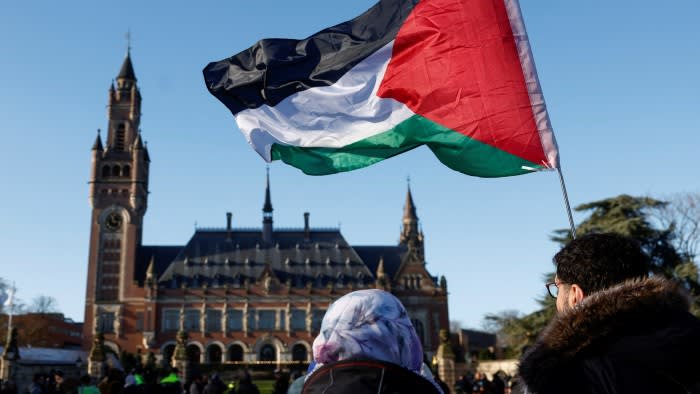Unlock the Editor’s Digest for free
Roula Khalaf, Editor of the FT, selects her favourite stories in this weekly newsletter.
The UN’s top court has ordered Israel to comply with international law on genocide in a politically explosive case that raises pressure on the conduct of its war in Gaza.
The International Court of Justice said Israel should limit harm to Palestinians in Gaza, but stopped short of calling for an immediate end to the military offensive.
Its interim ruling on Friday came shortly before the UN’s Palestinian relief agency said it had dismissed several employees over their alleged involvement in the Hamas attack that triggered the war.
UNRWA said it had ordered a probe after receiving information from Israel, while the US, which said it was halting aid to the agency, added the allegations concerned 12 UN employees “who may have been involved” in the October 7 attack.
The ICJ case had been brought by South Africa, which accused Israel of genocide in the Gaza Strip, allegations the country denies. In a blow to the Israeli government, the 17-strong panel of judges declined to throw the case out.
“The court is acutely aware of the extent of the human tragedy that is unfolding in the region and is deeply concerned about the continuing loss of life and human suffering,” said Joan Donoghue, the president of The Hague-based tribunal.
The case — which has left a western-backed democracy facing allegations of committing the highest international crime — has already made waves around the world.
After the order, Israeli Prime Minister Benjamin Netanyahu vowed to continue the military campaign while doing “our utmost to keep civilians out of harm’s way”.
Describing the allegation of genocide as “false and outrageous”, he depicted the court’s decision not to call for a ceasefire as a victory for Israel.
“Like every country, Israel has an inherent right to defend itself,” he said. “The vile attempt to deny Israel this fundamental right is blatant discrimination against the Jewish state, and it was justly rejected.”
But South Africa hailed the ruling, watched live by President Cyril Ramaphosa alongside Palestinian officials, as a “decisive victory for the international rule of law”.
Palestinian foreign minister Riyad al-Maliki said the decision “should serve as a wake-up call for Israel and actors who enabled its entrenched impunity”.
The US said it had “consistently made clear” to Israel the need to minimise civilian harm, but dismissed allegations of genocide as “unfounded”. The State Department noted the court had called for the unconditional release immediately of all hostages held by Hamas.
The EU said it expected “full, immediate and effective implementation” of all ICJ orders.
South Africa, which brought the case under the 1948 Genocide Convention, said at the ICJ this month that Israel’s assault had killed 1 per cent of Gaza’s population and injured one in four Gazans. It said that Israel had a “genocidal intent” that was “evident from the way in which [its] military attack is being conducted”.
Israel said such claims were “profoundly distorted” and that its forces in Gaza were complying with international law.
Israel declared war after the October 7 attack, in which 1,200 people were killed and a further 250 taken hostage, according to Israeli officials.
Israel’s retaliatory assault on Gaza has killed more than 26,000 people, according to Palestinian officials, as well as displacing 1.7mn of the enclave’s 2.3mn inhabitants, and reducing huge swaths of the territory to uninhabitable rubble.
A final ruling in the case will probably take years and Friday’s decision relates only to South Africa’s request for emergency measures while the case is heard.
South Africa had requested nine emergency measures. The court ordered six, including instructions for Israel to preserve evidence relating to the case and to submit a report to the tribunal within one month on the measures it is taking to comply.
The court’s decisions on emergency measures are legally binding, but it cannot enforce them itself. In March 2022, it ordered Russia to suspend its military operations in Ukraine, but Moscow refused to comply.
Additional reporting by Mehul Srivastava, Felicia Schwartz, Rob Rose and Mai Khaled

Sophie Anderson, a UK-based writer, is your guide to the latest trends, viral sensations, and internet phenomena. With a finger on the pulse of digital culture, she explores what’s trending across social media and pop culture, keeping readers in the know about the latest online sensations.








